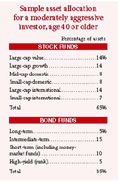Article
Tactical analysis, not market timing
Investment Consult
A good investment adviser will tell you not to trade frequently in hopes of riding a potential investment wave. Known as market timing, it's a strategy that usually brings poorer returns than just holding fast.

But are those moves just a rose by another name? If you're moving money from fizzling segments to those that seem promising, that kind of sounds like market timing. What's the difference?
Market timing is often based on "technical analysis," which charts a stock's past price movements and zeroes in on patterns that are believed to predict future action. Some investment advisers think technical analysis is akin to financial witchcraft, while others use it all the time. This contrasts with "fundamental analysis," which tracks a company's growth, earnings, and market position.

Other market timers eschew technical and fundamental analysis and boast that they can pinpoint information-interest rates, world economic forces, esoteric chart patterns, even the winner of the Super Bowl-that will precede certain market moves. Many of these same gurus will also happily sell you expensive newsletters urging you to follow their tips.
In any event, I find that market timing tends to focus on the short term, whereas most individual investors-including busy doctors-would do well to buy and hold for the long term.
Of course, as I mentioned earlier I don't suggest that you remain completely passive with your portfolio; you can and should shift things around from time to time. Yet I maintain that most of a portfolio's returns over the long term are due to asset allocation, not market timing.
For this reason, I, and many other advisers, follow a strategy called "tactical asset allocation," or tactical analysis. It takes readily available information on market outlook and price potential, and raises or lowers each asset class's weighting depending on its relative attractiveness. For example, one of my clients might have 15 percent of her money in small-cap stocks, 15 percent in mid-caps, 10 percent in internationals, 30 percent in large-caps, and 30 percent in bonds. But six months later, I might advise her to shift to 20 percent small-caps, 25 percent mid-caps, 20 percent large-caps, etc., to take advantage of potential movements within asset classes.
Unlike market timing, though, tactical analysis isn't based on what will happen in the next few weeks or months, but over the following one to three years. There's a more long-term outlook, and not much turnover once you put your money in.





